I really didn't wanna post any of this until I had finished it or at least done it up to the late 90s but this particular campaign really sucked me in and even though I knew the outcome it got me excited just reading and writing about it. Feel free to make any corrections or additions to it based on personal memory or other sources.
***************
The World Cup qualifiers for the 1974 World Cup began in mid 1973. Asian teams were separated in two zones with each zone consisting of two groups. Iran was grouped with India, Kuwait and North Korea. India’s subsequent withdrawal allowed late entrants North Korea to take their place in the competition. In spite of the games being billed as home and away, however, all games (both home and away and for all teams) were played in Tehran.
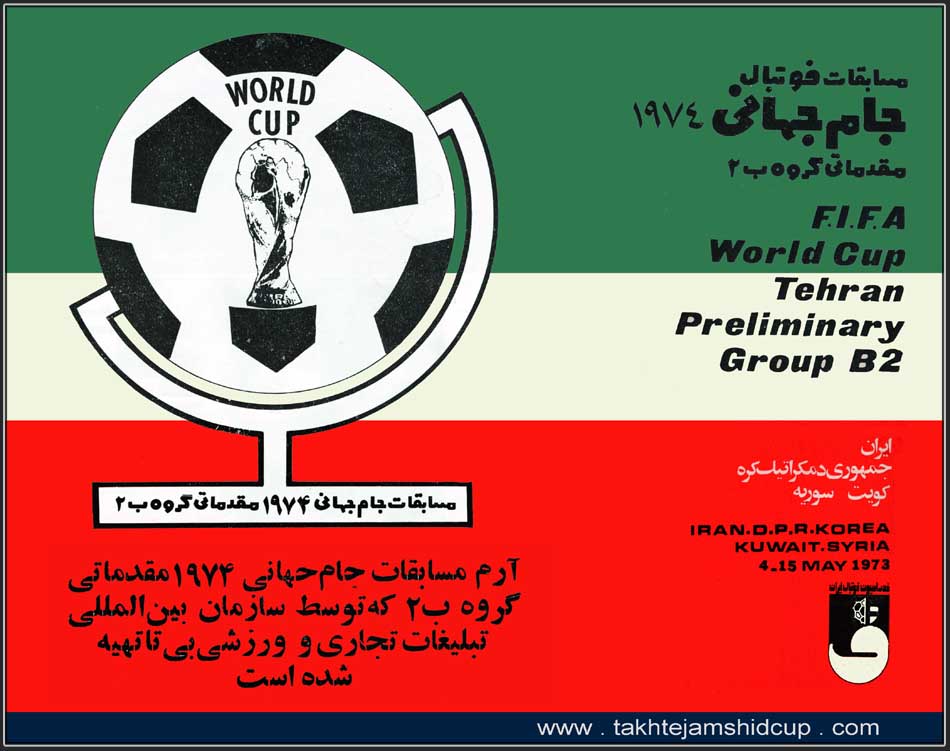
Other than the obvious prize of qualifying for the World Cup, the Koreans were also motivated by a revenge factor, having not forgotten their elimination by Iran after three games for the 1972 Olympics. The Koreans arrived eight days prior to the start of the games to acclimate to their host country. Their meticulous planning and practices prompted their coach to declare them not only winners of their qualifying group, but the lone Asian representative at the 1974 World Cup. On the other hand Iran had little to no preparation. English club Stoke City, featuring World Cup winners Geoff Hurst and Gordon Banks, had been invited by Persepolis for a friendly game and there were talks about switching the opponent to the national team, however, the friendly took place as originally scheduled.
Iran’s campaign began with a match against North Korea. In this game in spite of the support of 80,000 fans at the stadium, North Korea appeared slightly better and deserving of full points. Iran’s forwards created few chances and in particular their aerial game was neutralized by the smart and organized play of the Korean defenders and keeper. The Koreans won most of the one on one battles and carried out their game tactics perfectly while Iran seemed to be running high on emotions. The hero of the match for Iran was goalkeeper Rashidi whose reflexes saved at least five Korean chances. In the end the teams settled for a 0-0 tie.
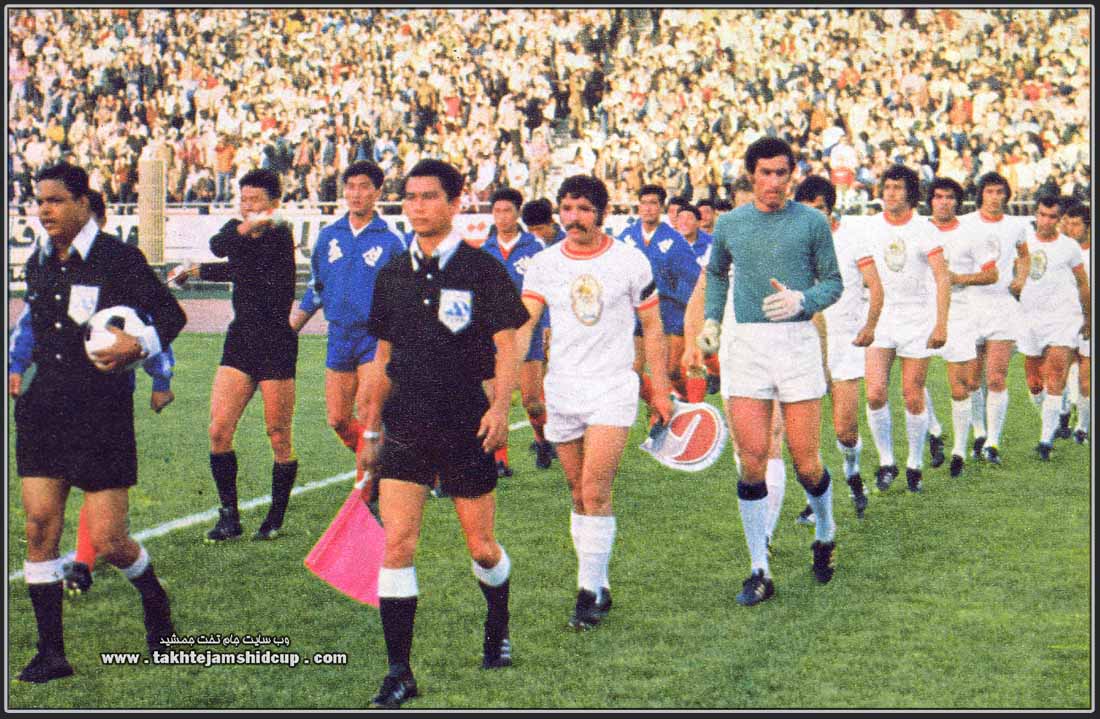
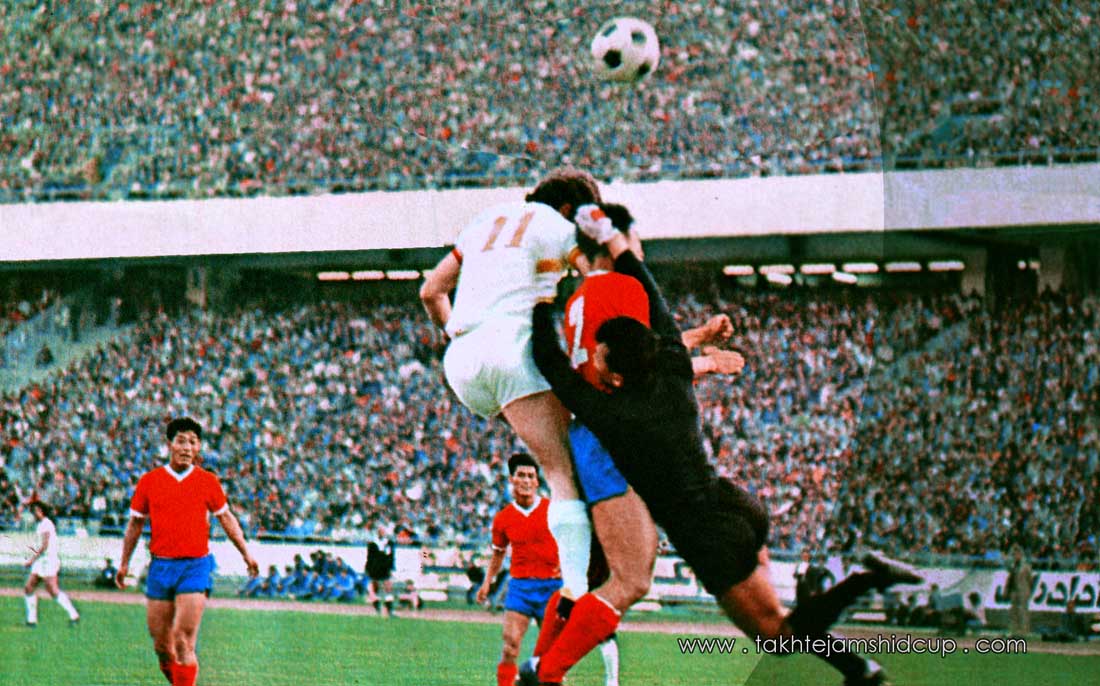
In spite of the problems in the opening game, Iran cruised to four straight victories to top the group and face the winner of the other group. Goals by Vafakhah and Parvin earned a 2-1 victory over Kuwait.
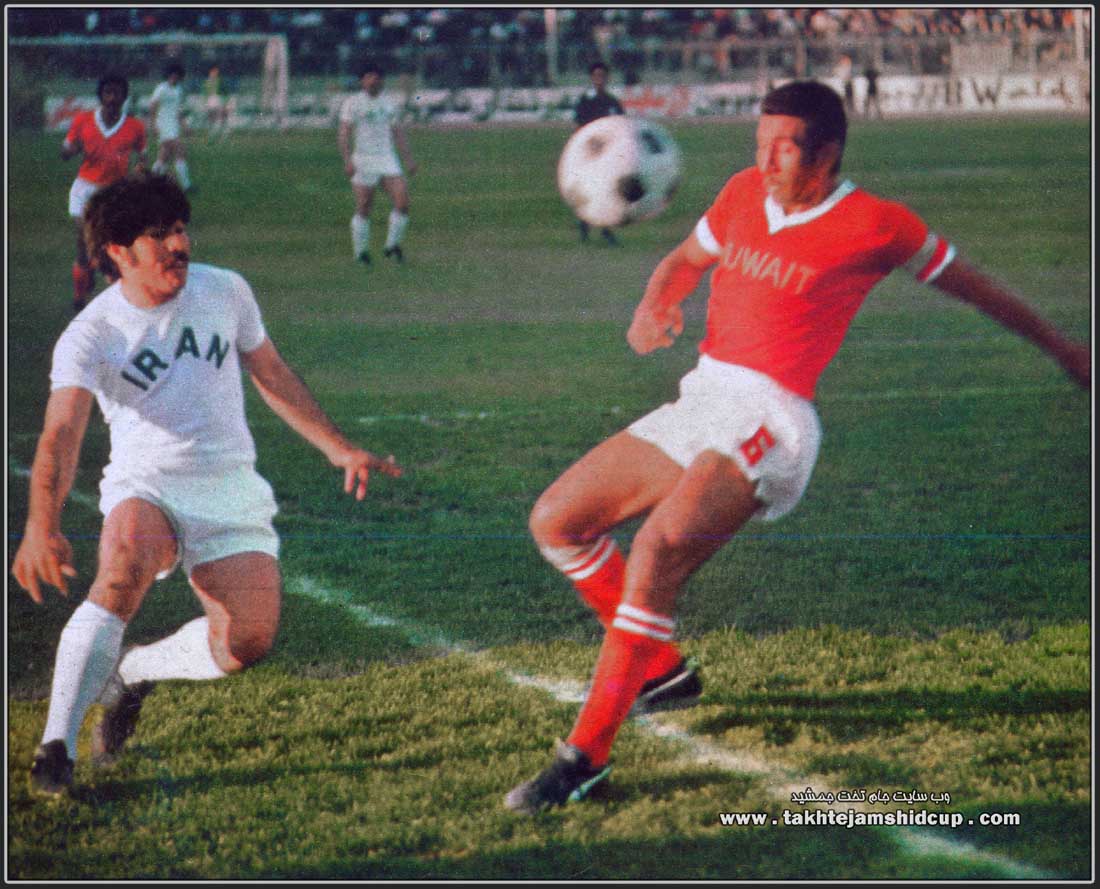
Syria was shut out and defeated 1-0 courtesy of Kargarjam’s goal. While Rashidi was the keeper of choice for the first leg matches, Hejazi was inserted in the lineup for the return games. A last minute header by Parvin bounced off of the crossbar only for Sadeghi to convert it into the game winner against North Korea. This coupled with an opening goal by Monajati resulted in a 2-1 win. Rashidi saved a penalty kick in this game and was dubbed “The Brave of Iran".
Kuwait was brushed aside 2-0 with Ghelichkhani (from the penalty spot) and Jabbari scoring. With first place already assured, Iran dropped an inconsequential match against Syria by a score of 1-0 and advanced to the next round to face Australia with the winner of the series facing the top team of the other Asian zone.
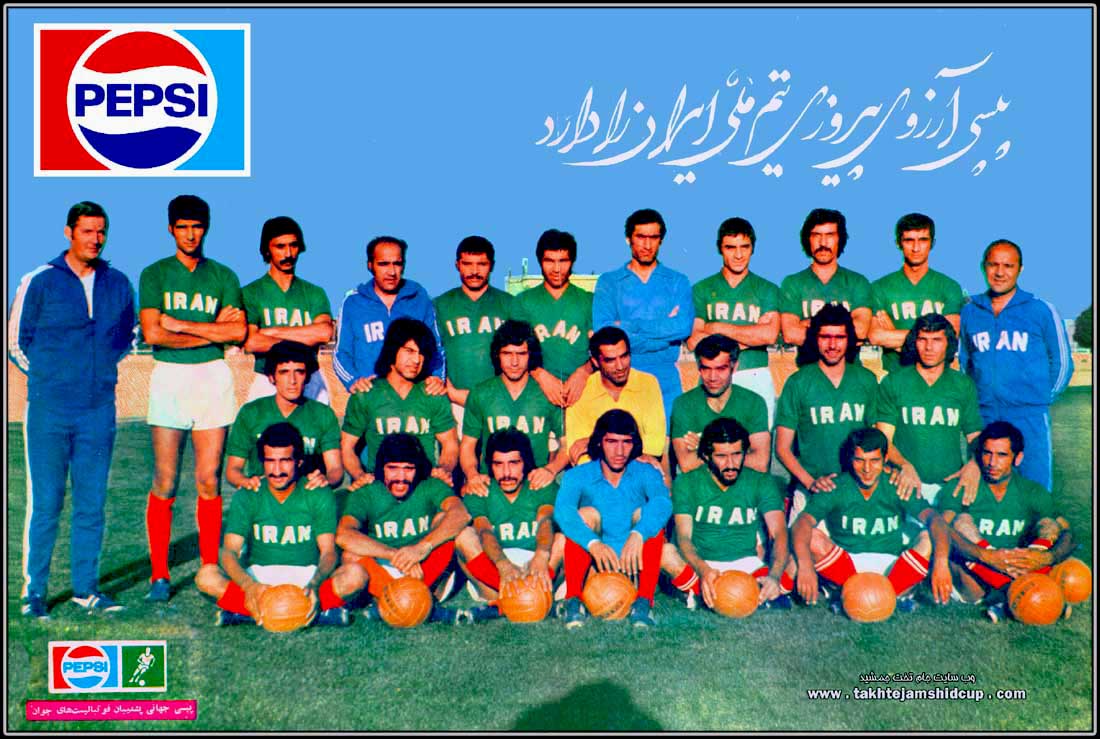
The first game of the series would be away in Australia. In preparation for the match, Iran played a friendly in New Zealand against Canterbury Province selection. The poor result aside (1-1), the main setback for Iran was the knee injury that Parvin suffered which sidelined him for the upcoming game.
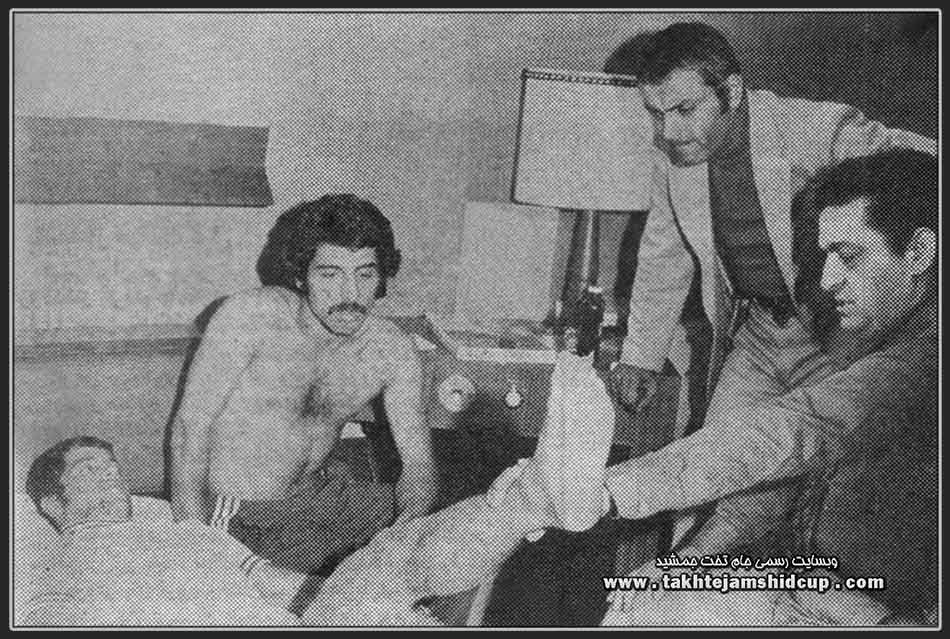
A second game against New Zealand’s national team ended in a 0-0 draw. Due to the presence of Australia’s coach, Iran opted to field mainly substitutes and players out of position so as to not give away any of their tactics. Following these matches, Australia’s coach began his psychological games by stating that not only was he aware that this wasn’t Iran’s main team, but that he was already fully aware of Iran’s usual game plan. Furthermore, he stated playing two tough games this close to the main match would have exhausted Iran’s players and they would not be able to recover in time. He concluded by stating that the series would be wrapped up in Sydney and the second leg in Tehran would just be a formality.
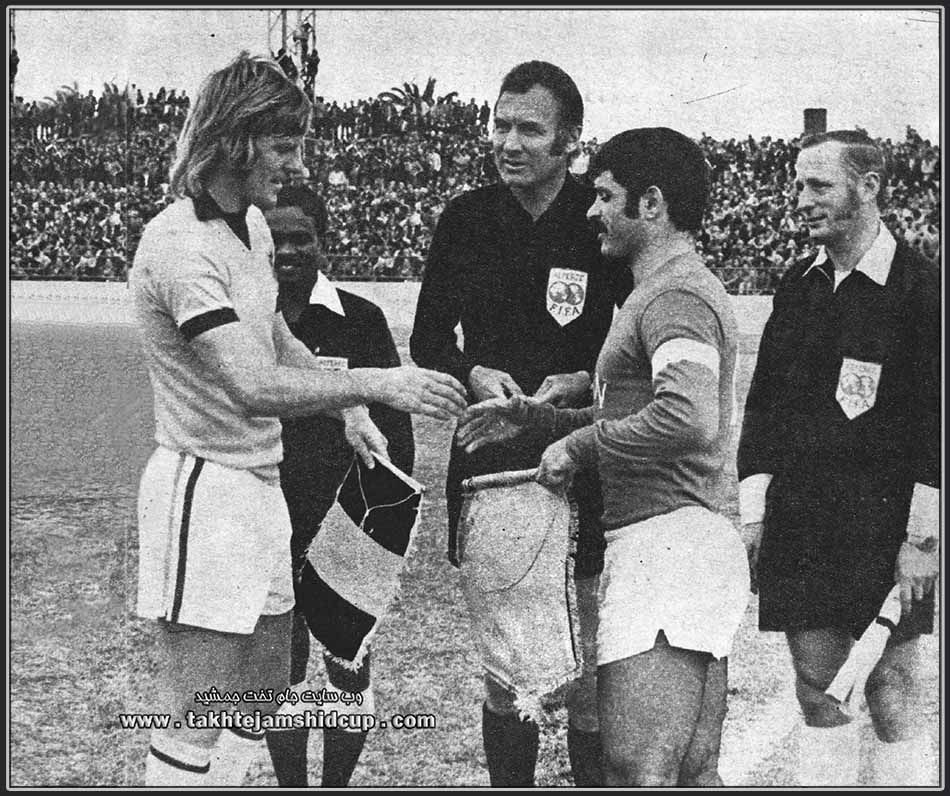
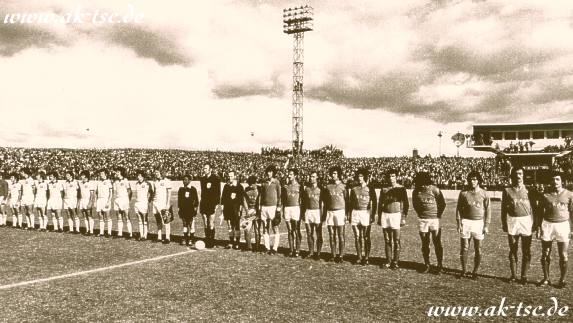
More than 30,000 fans packed the Sydney Sports Ground to watch the 1st leg. Prior to the game some fans from both sides actually stormed the field and had to be detained and escorted out. Iran finally kicked off the match. Both teams had early chances with Kargarjam breaking up a dangerous Australian freekick and Mazloomi sending his chance wide. Another Australian chance was saved on the line by Kashani. Mid way through the half, Hejazi had to react swiftly to stop a thunderous shot. With only a few minutes until halftime, Australia earned a free kick on the right flank. Hejazi came off of his line to stop the initial header and the following rebound, but an empty net provided an easy subsequent shot for the Australians to take the lead.
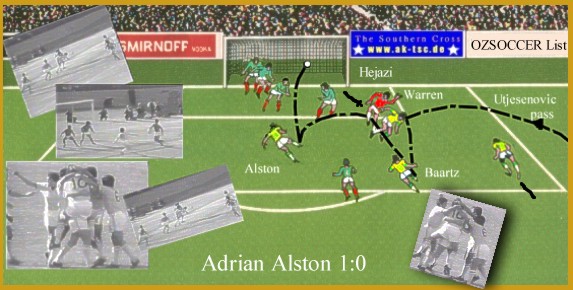
For the second half Iranpak had to be substituted out due to a suspected broken leg. Only minutes into the second half, Australia scored again. A series of quick passes ended with a shot to the near post for which Hejazi should have reacted better.
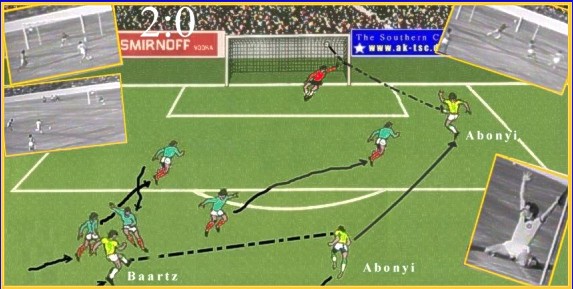
While Australia had more chances to increase their lead, they had to wait until the 83rd minute for a 3rd goal. Off a free kick from the right side, the last goal was headed in past Hejazi.
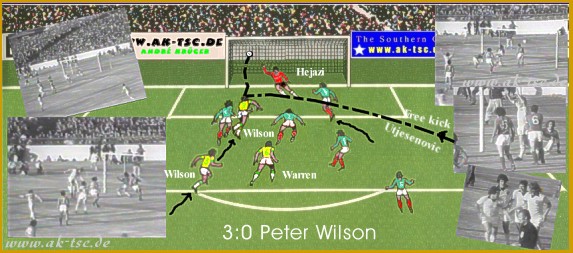
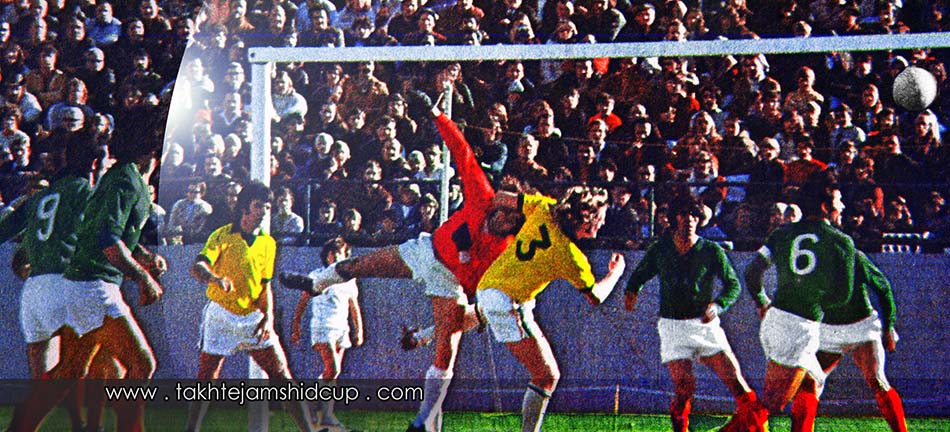
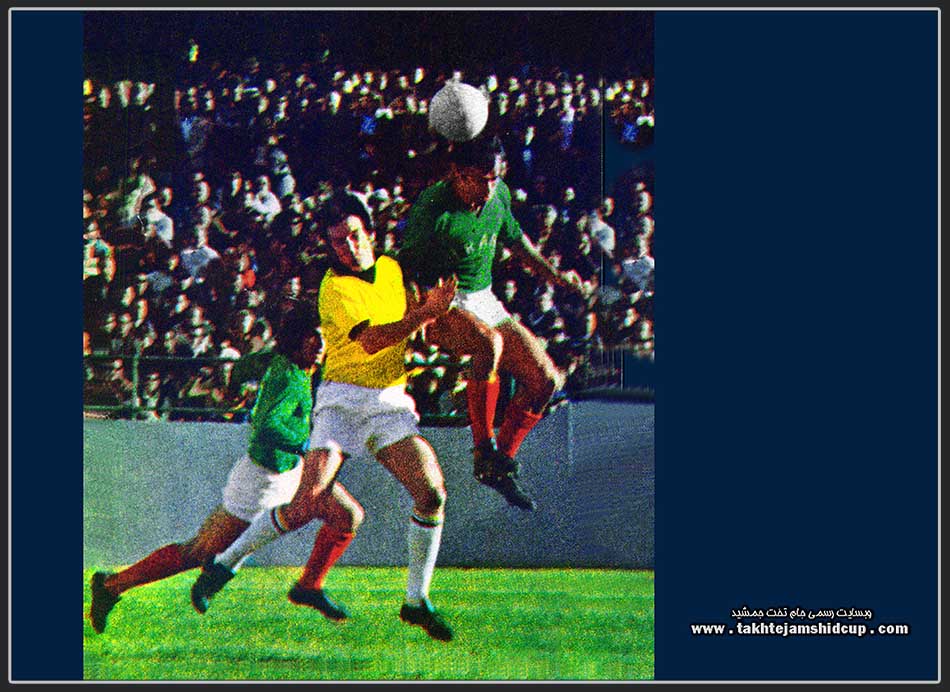
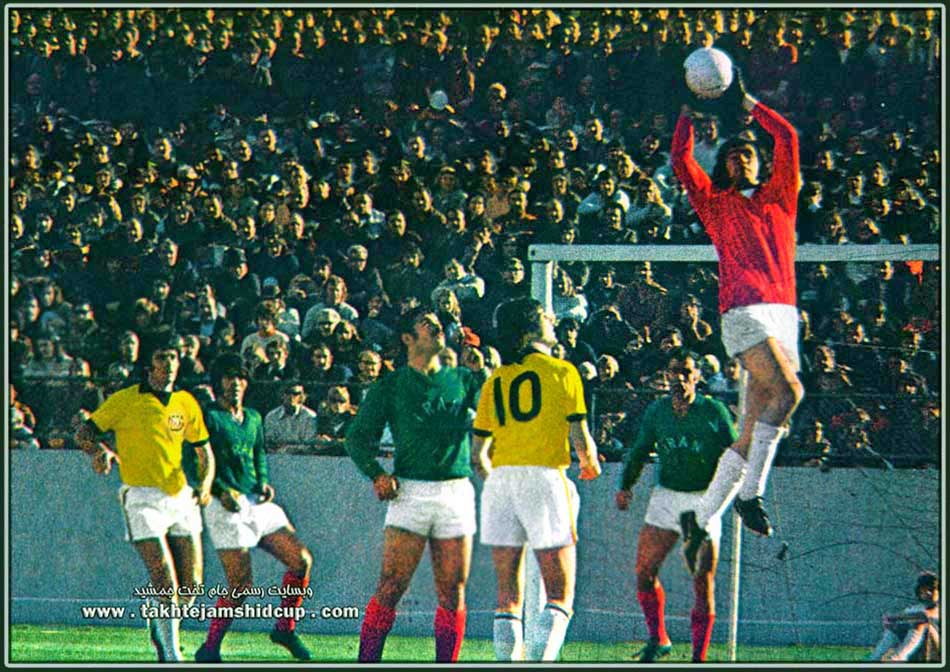
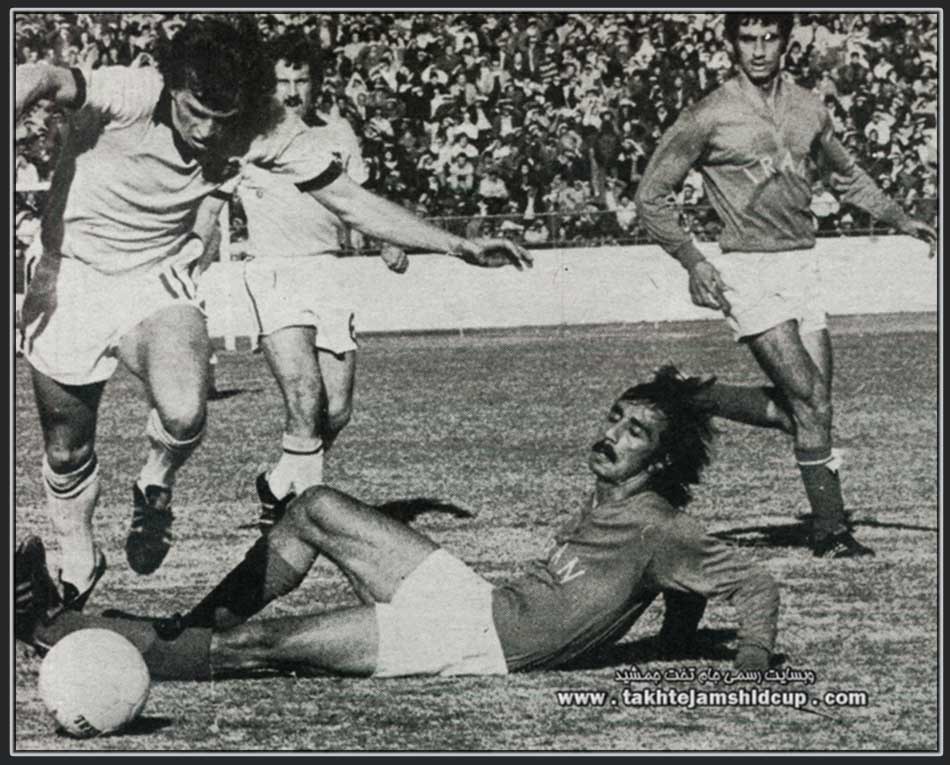
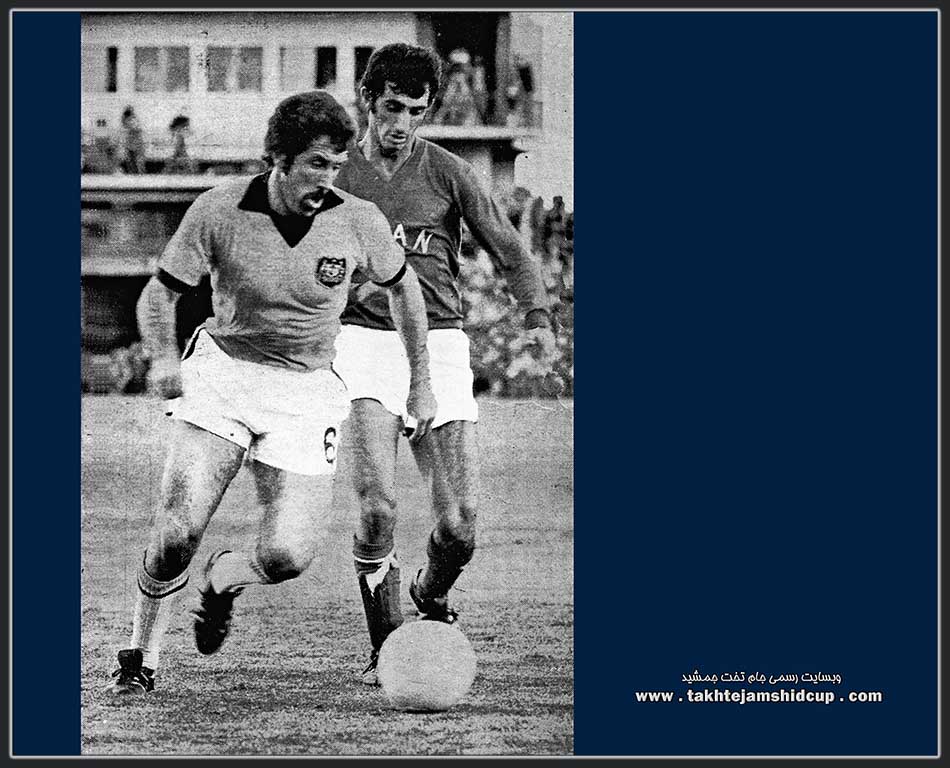
The tense flight back home, which coincidentally also had the Australian squad on it, was met with angry fans at Mehr Abad Airport with some pelting the players with various objects and police finally escorting the team away. In spite of the lopsided score, fans were still hopeful to overturn it. Australian players and staff would later report that any time they were spotted in pubic, people would hold four fingers up, indicating what they thought the result of the return match would be. The day before the game, Australia practiced in Ariamehr Stadium and after their session was over began leaving. However, the sight of Iran’s team entering the field for practice prompted them to stay put and observe them. In response Iran’s players went back into their locker room and eventually waited out the Australians before starting their own session. A further blow to the team’s psyche was a Taj publication that somehow made it to the team’s hotel in which team captain Ghelichkhani was labeled as a traitor and sell out. Prior to the match Ghelichkhani promised his family he would score two goals against the Australians.
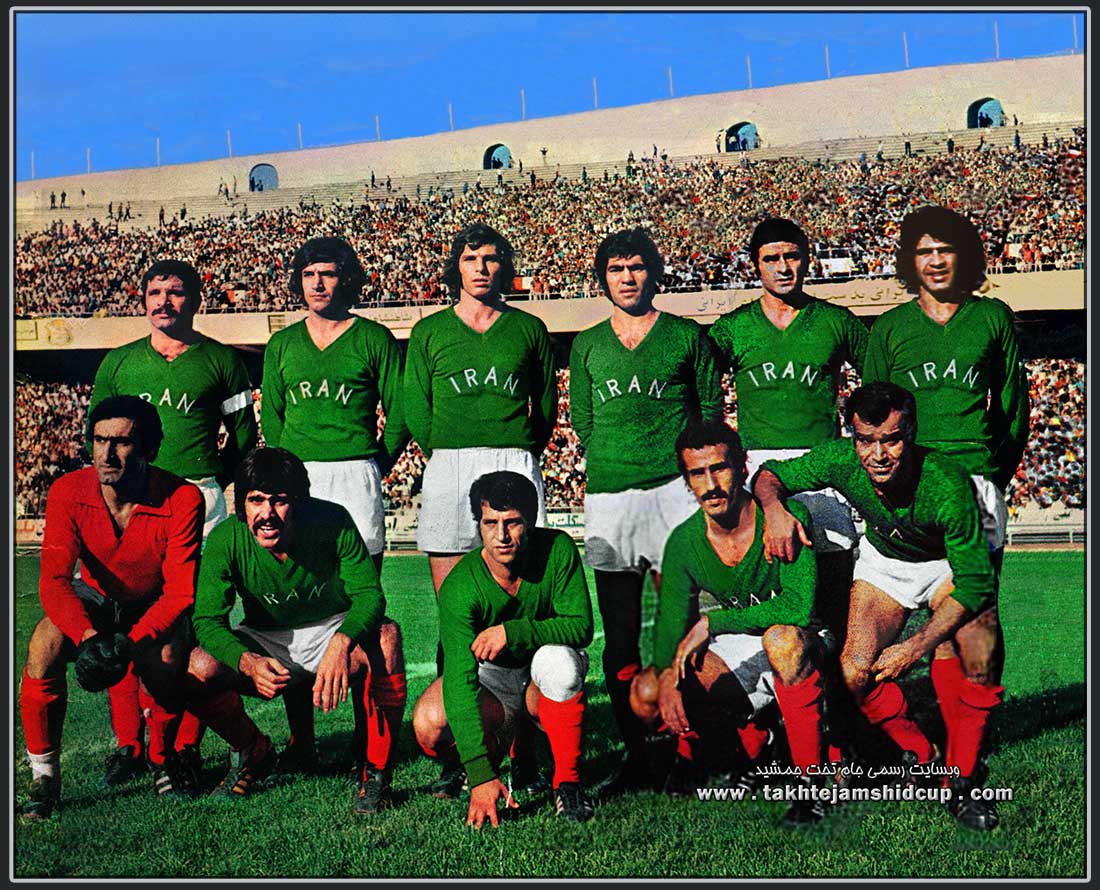
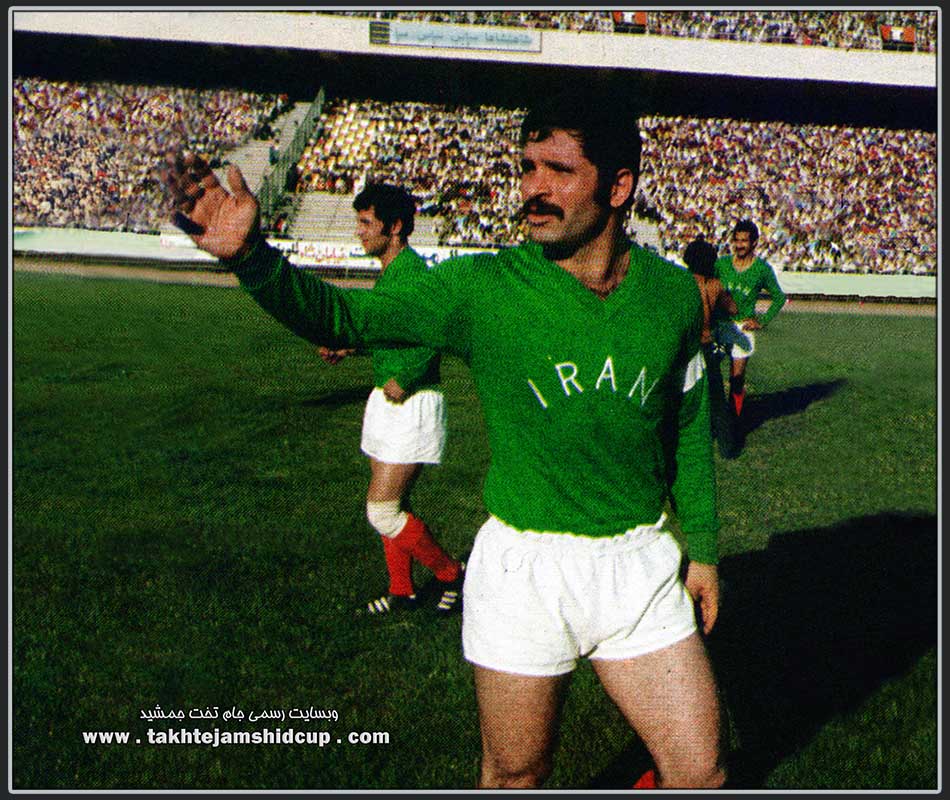
There had been some changes in Iran’s lineup. Hejazi had given his spot to Rashidi in goal while Parvin seemed fit for the return match. The packed stadium, intense heat and distinct shrill were all small factors that everyone hoped would help reverse the first leg’s result. From the opening whistle Iran put Australia under pressure. In the 15th minute, following a bump in the box, Iran was awarded a penalty kick in spite of Australian protests. Ghelichkhani took the kick and hit it straight down the middle to give Iran the lead.
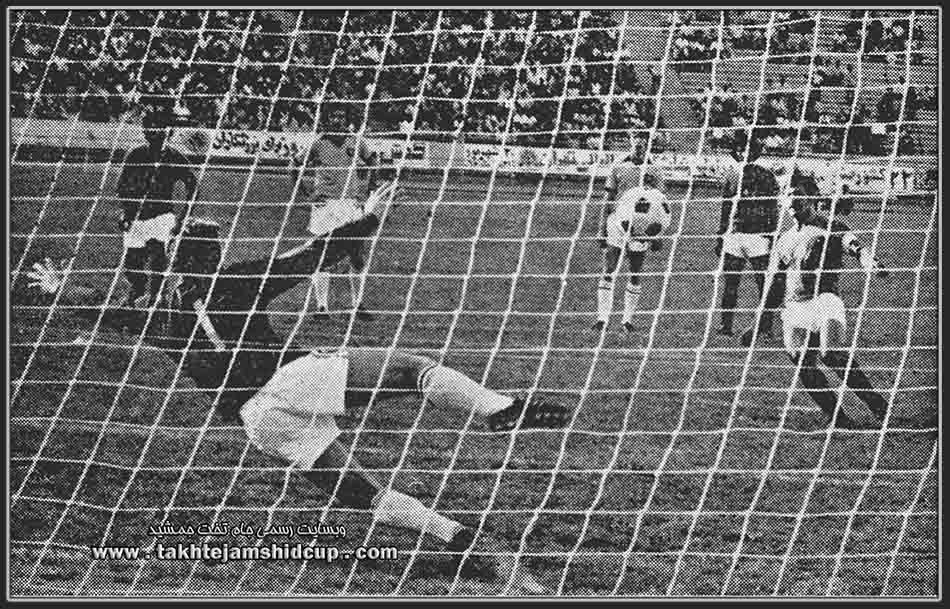
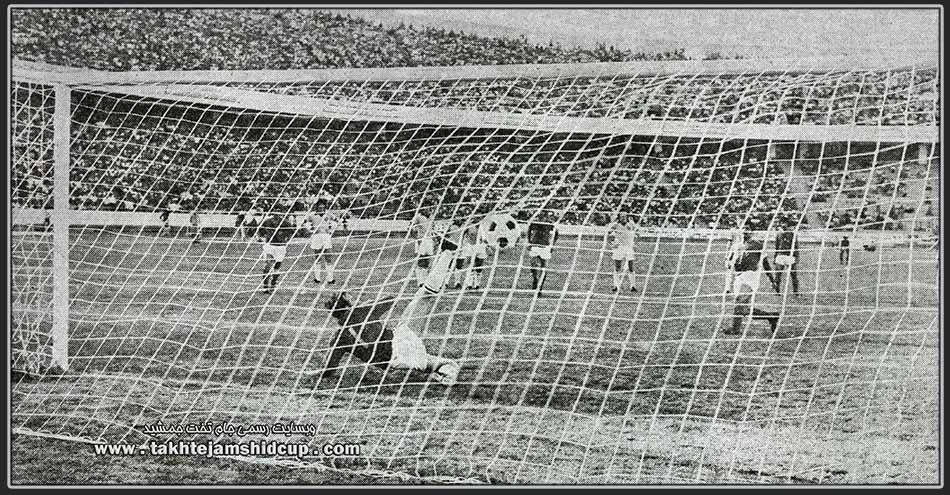
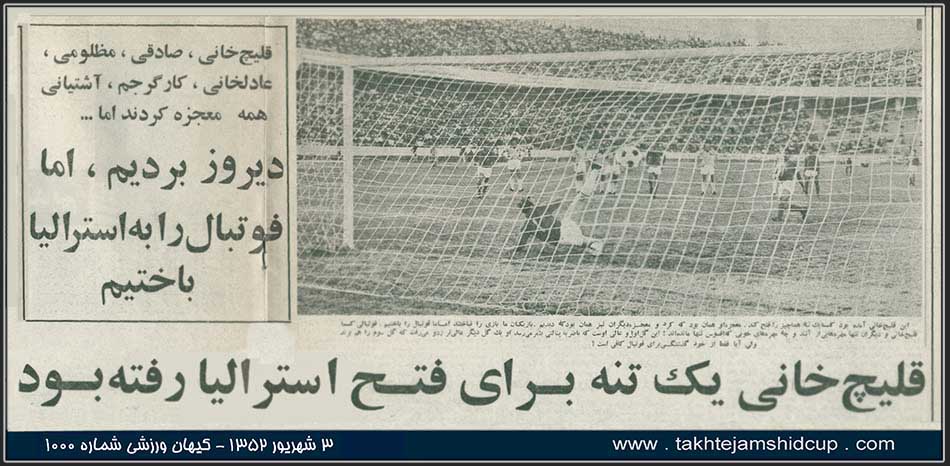
The early goal lifted the hearts of the players and increased the intensity of the crowd, giving hope that the deficit could be made up. In the 32nd minute following a failed Australian tackle, Ghelichkhani took possession of the ball and Iran launched an attack. A long ball found its way to the edge of the box which was passed back by Mazloomi to Ghelichkhani. His one-time thunderous shot from outside of the box was unstoppable and Iran took a 2-0 lead. With 58 minutes left, a crucial third goal seemed more than possible.
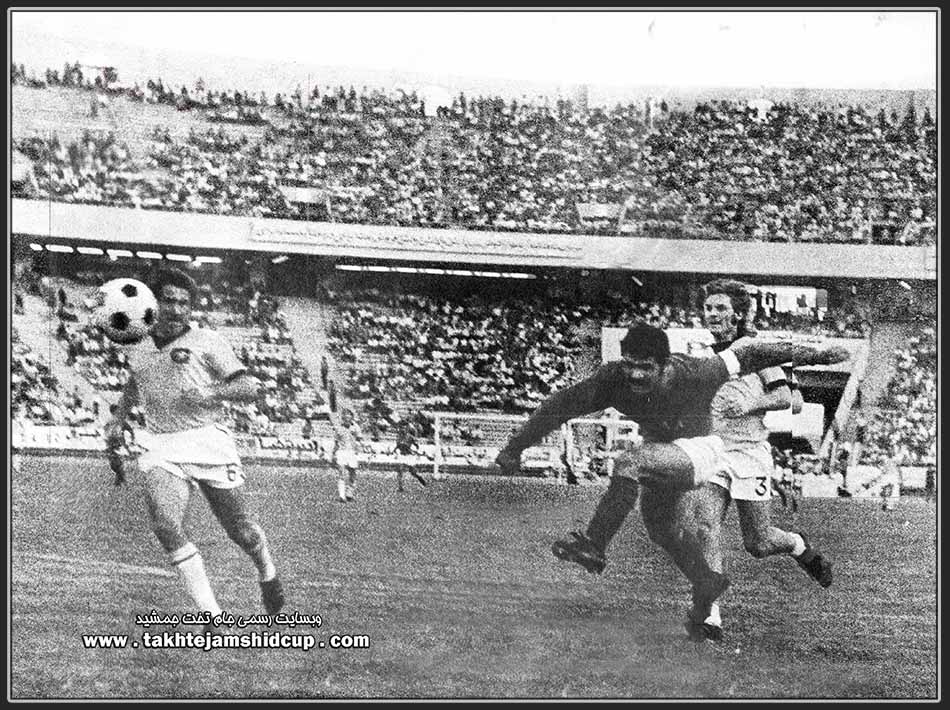
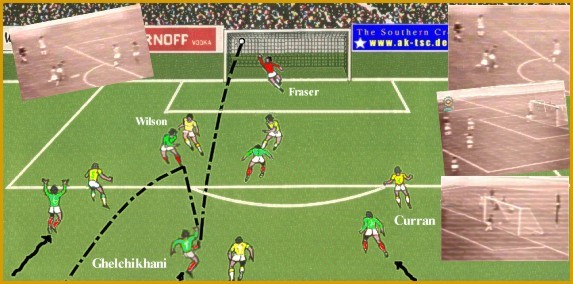
In the second half Mazloomi intercepted a backpass for the keeper but before managing to get his shot off was stripped of possession. Minutes later off of a free kick, Ghelichkhani launched a downward header that the keeper barely got his hands on.
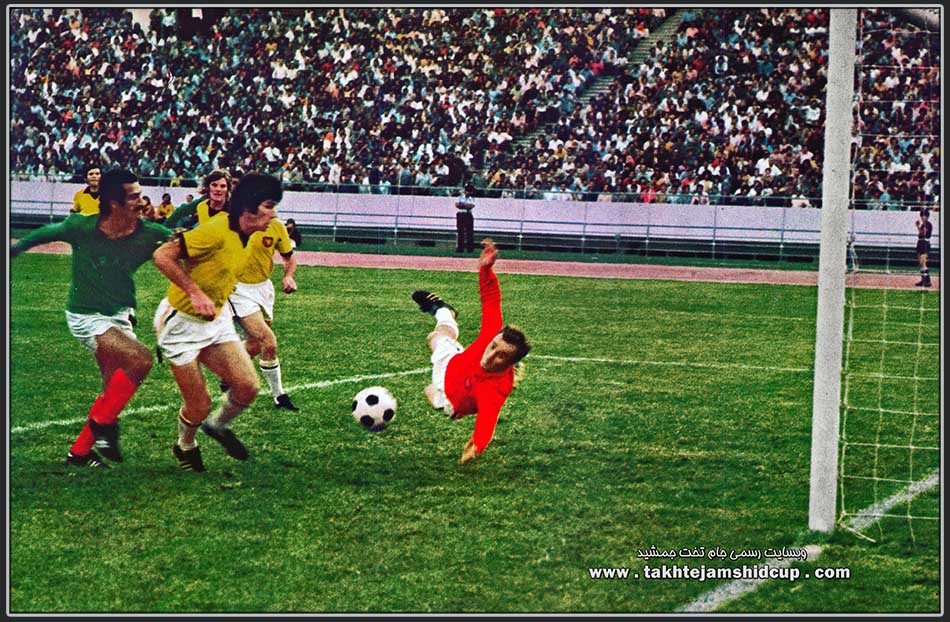
Ashtiani was the first to the rebound and his shot from a tight angle banged off of the crossbar. Throughout the game Australia had one clear cut chance in which they shot wide from three meters out. The Australian keeper made save after save to keep his team in the match. The Australians withstood all the pressure and with much luck prevented any more goals from Iran. In spite of the aggregate win, the Australians still complained about the ref and his penalty kick call. Australian forward Aboyni accused Iran of bribing the ref, claiming he had seen a gold watch the ref had received and heard stories about beautiful girls leaving the ref’s hotel room. After the final whistle Ghelichkhani openly wept as in spite of the win Iran had been eliminated from the 1974 World Cup qualifiers.
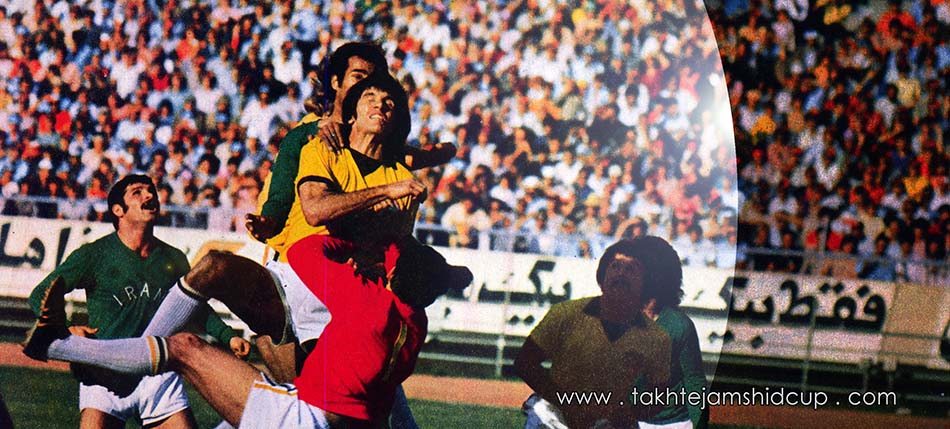
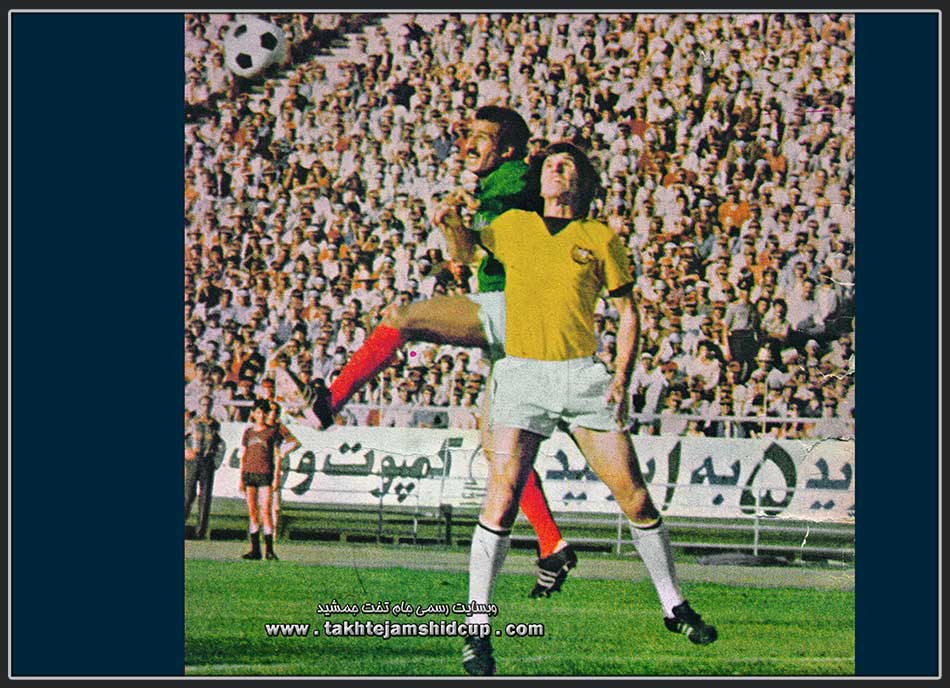
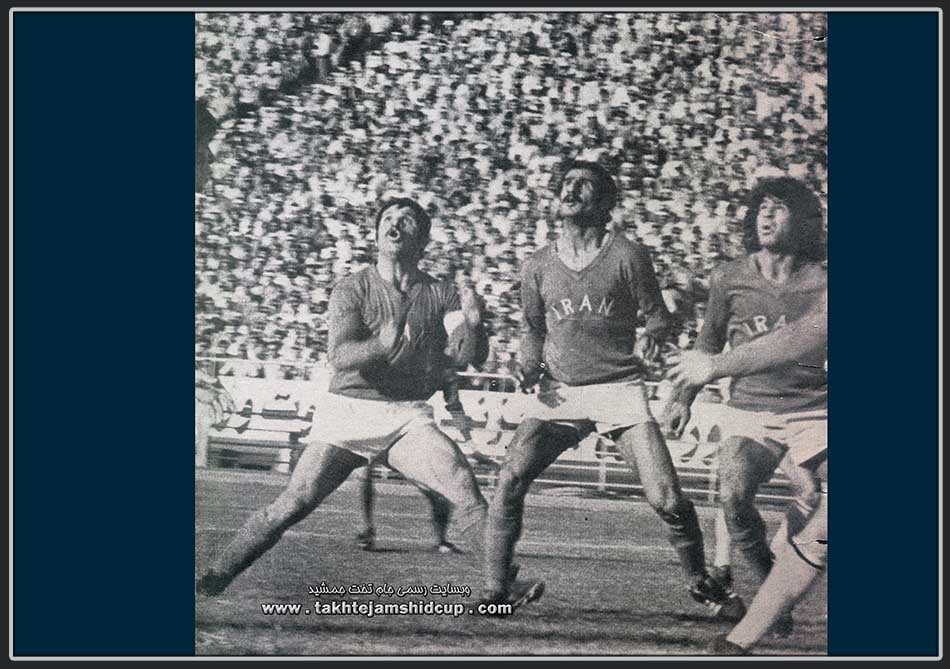
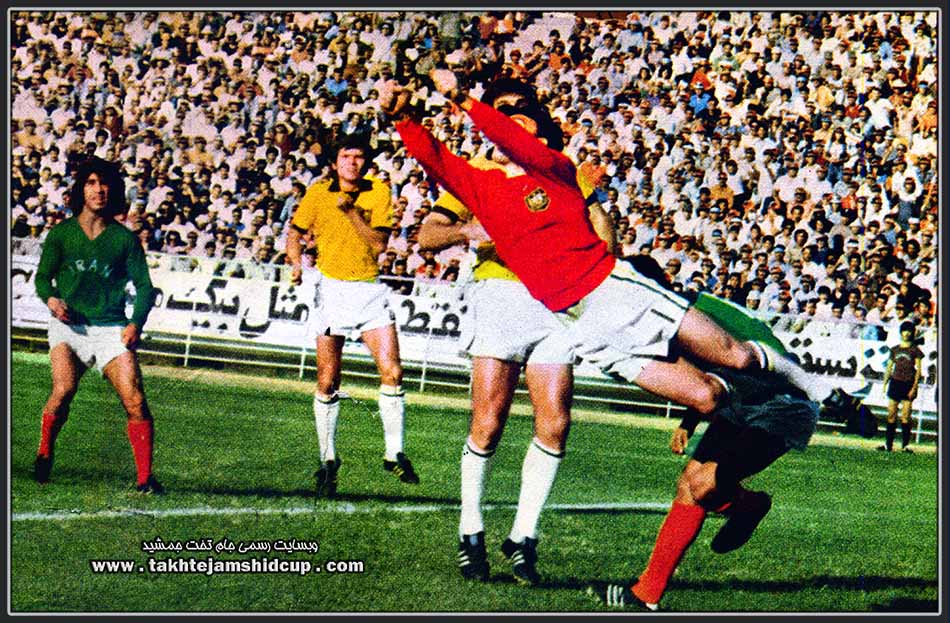
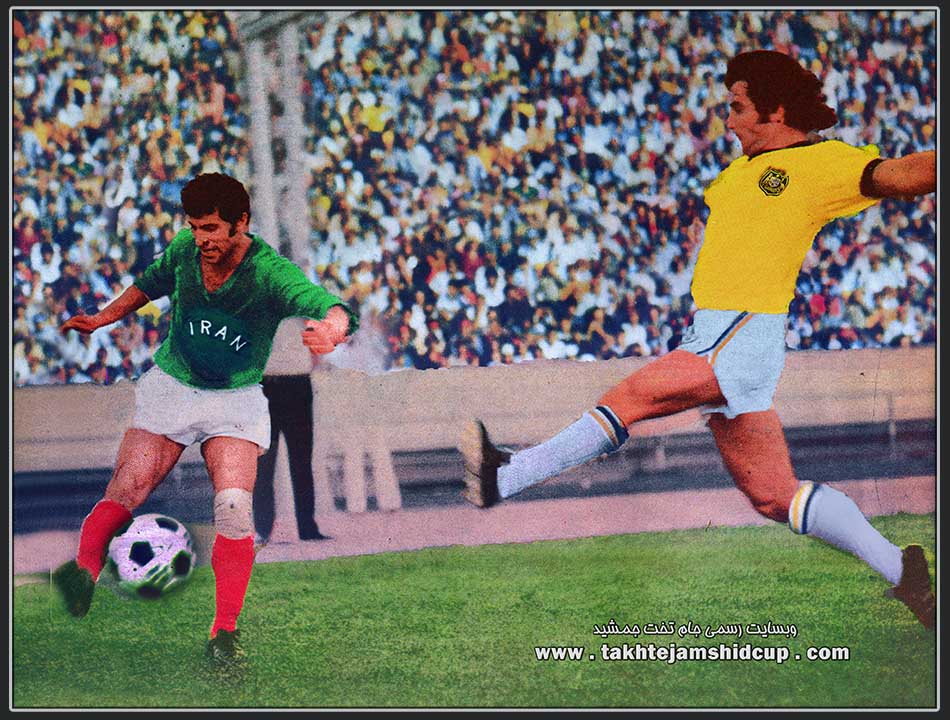
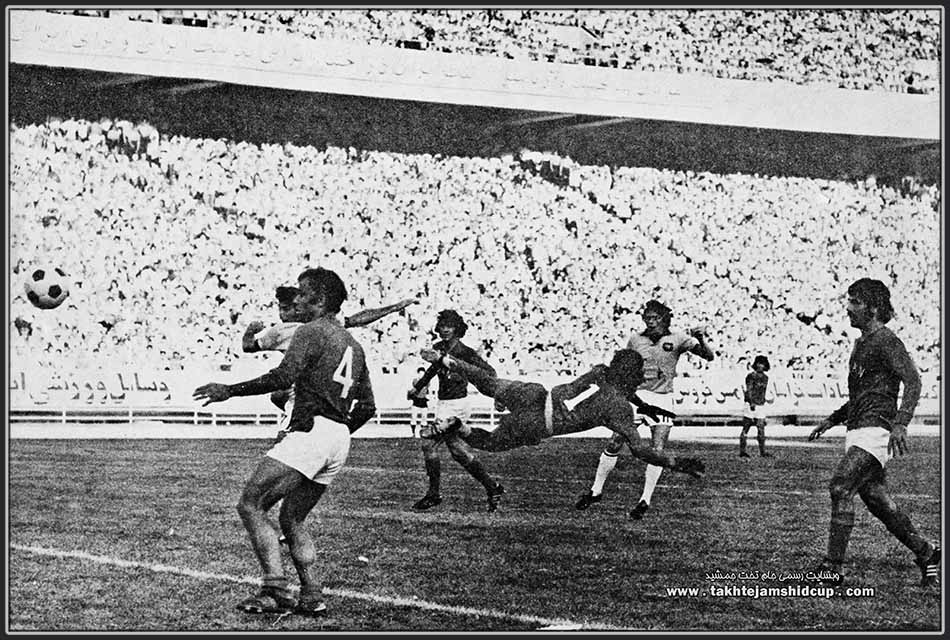
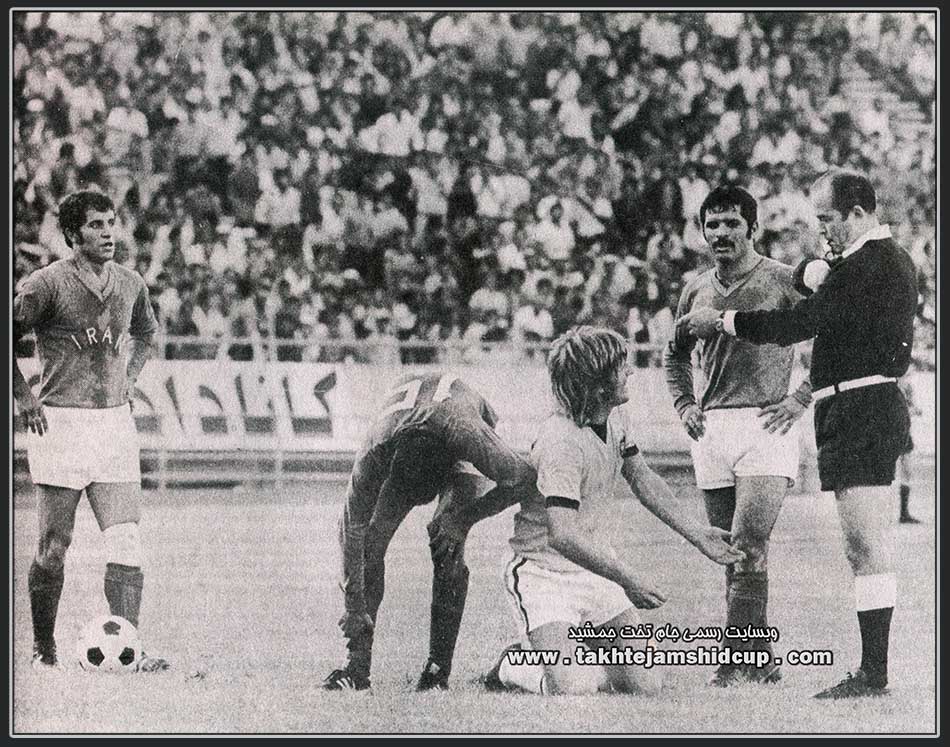
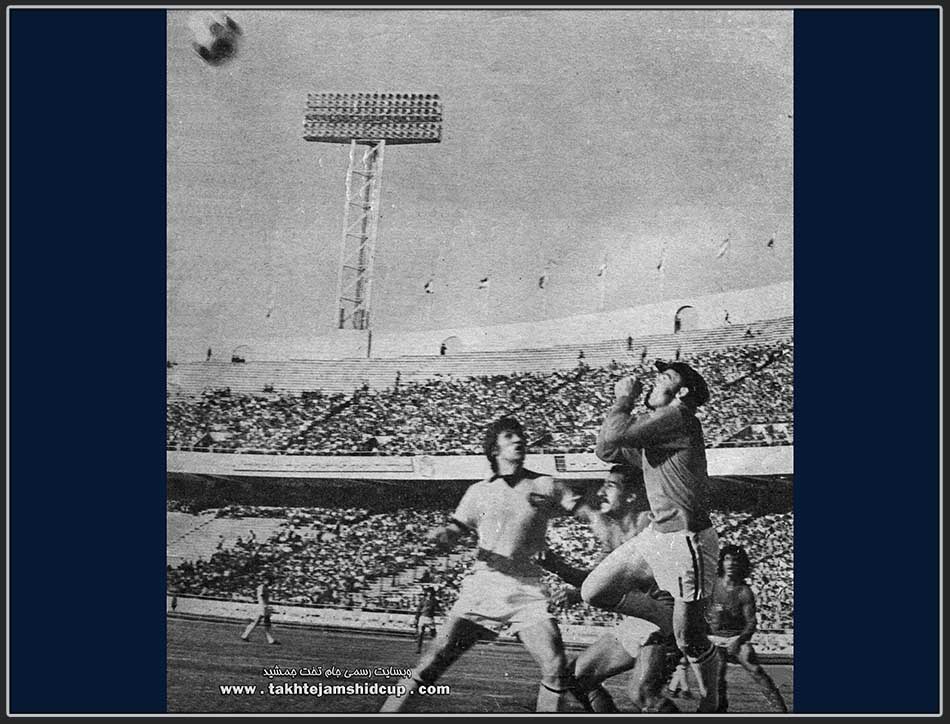
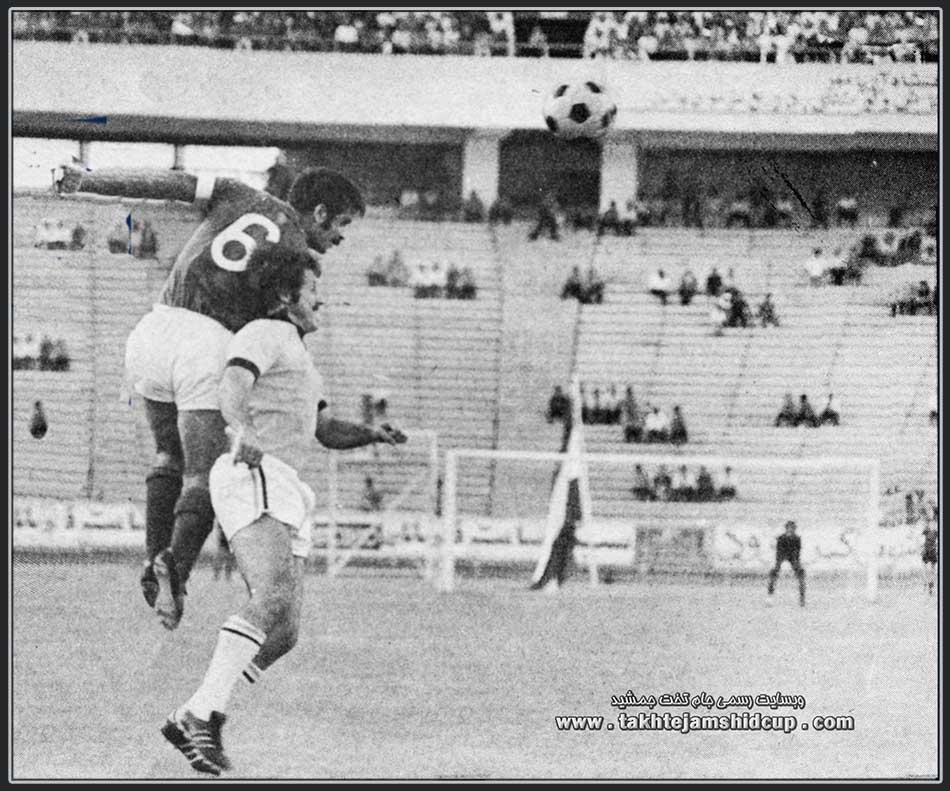
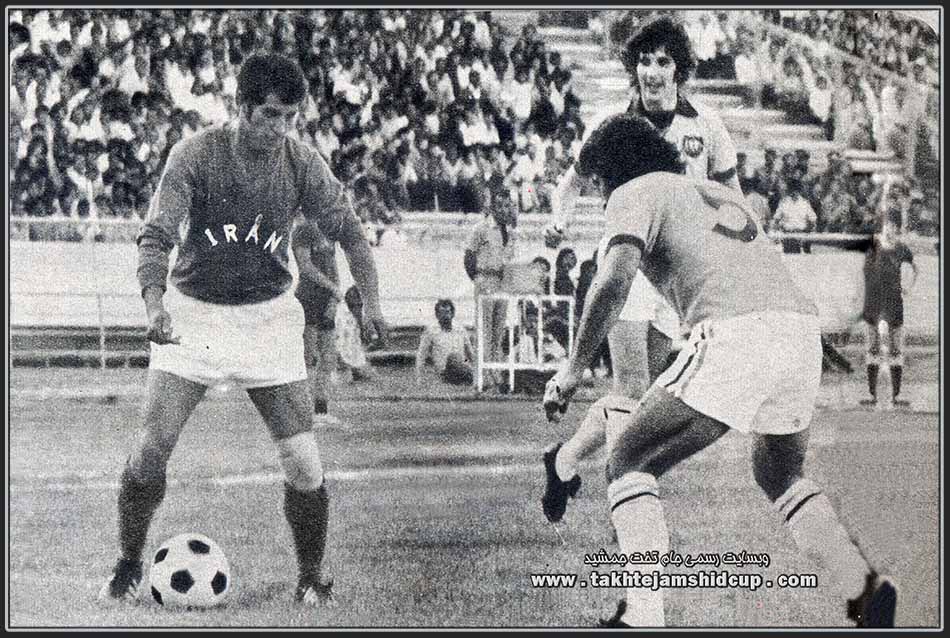
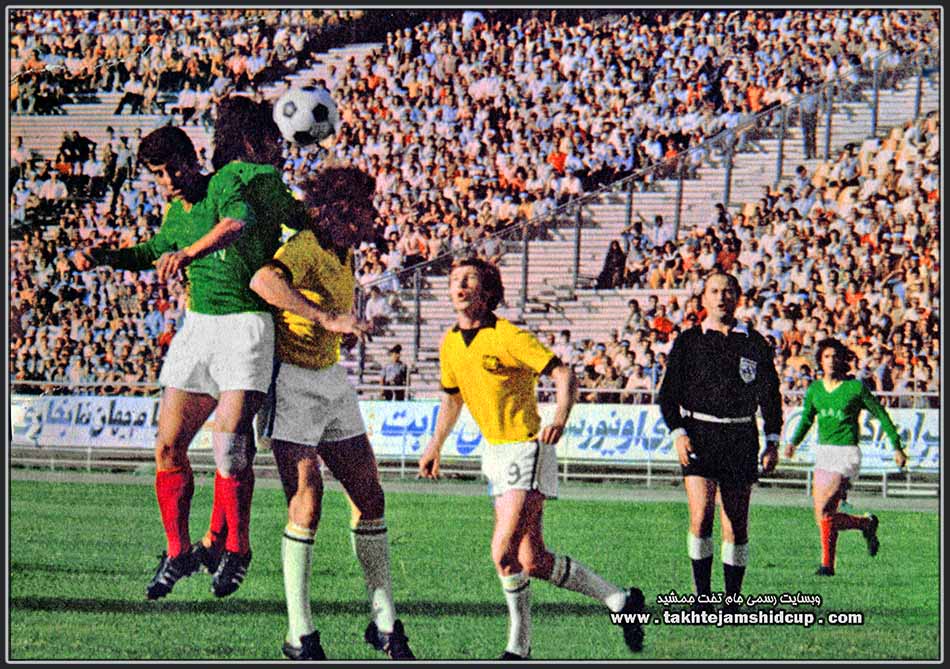
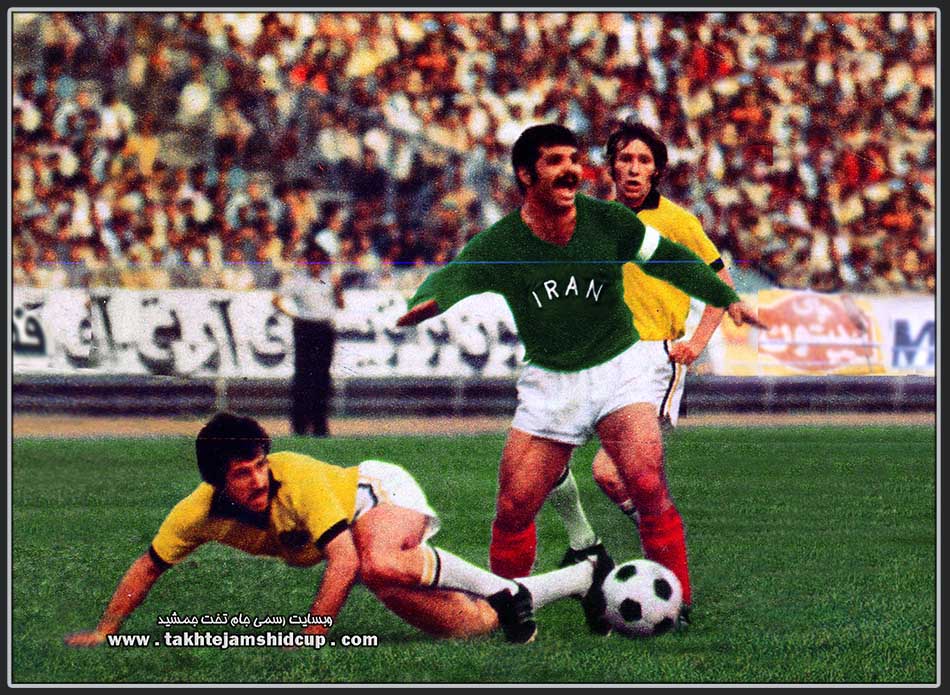
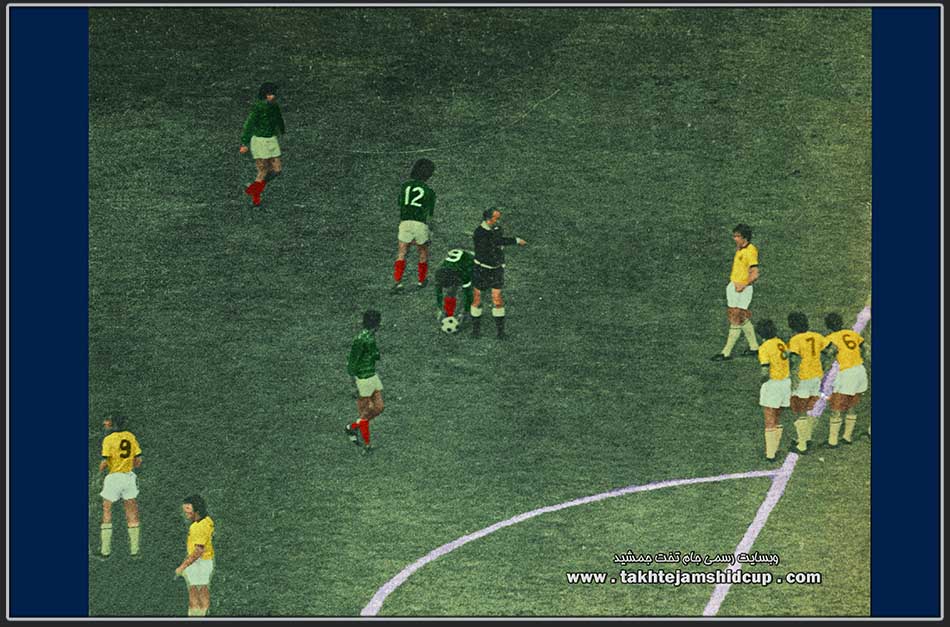
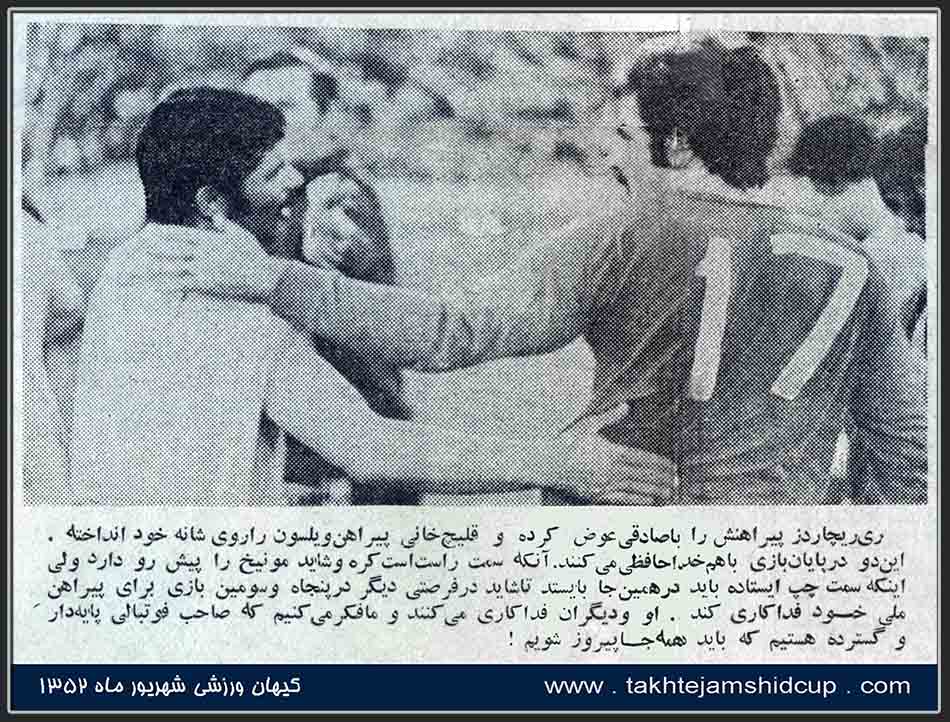
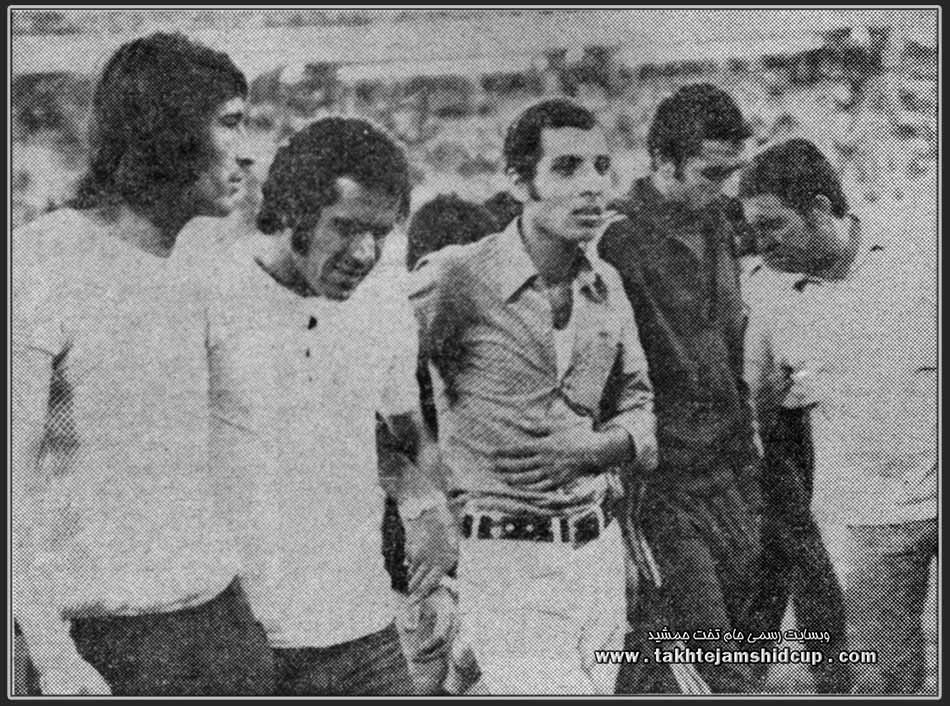
***************
The World Cup qualifiers for the 1974 World Cup began in mid 1973. Asian teams were separated in two zones with each zone consisting of two groups. Iran was grouped with India, Kuwait and North Korea. India’s subsequent withdrawal allowed late entrants North Korea to take their place in the competition. In spite of the games being billed as home and away, however, all games (both home and away and for all teams) were played in Tehran.

Other than the obvious prize of qualifying for the World Cup, the Koreans were also motivated by a revenge factor, having not forgotten their elimination by Iran after three games for the 1972 Olympics. The Koreans arrived eight days prior to the start of the games to acclimate to their host country. Their meticulous planning and practices prompted their coach to declare them not only winners of their qualifying group, but the lone Asian representative at the 1974 World Cup. On the other hand Iran had little to no preparation. English club Stoke City, featuring World Cup winners Geoff Hurst and Gordon Banks, had been invited by Persepolis for a friendly game and there were talks about switching the opponent to the national team, however, the friendly took place as originally scheduled.
Iran’s campaign began with a match against North Korea. In this game in spite of the support of 80,000 fans at the stadium, North Korea appeared slightly better and deserving of full points. Iran’s forwards created few chances and in particular their aerial game was neutralized by the smart and organized play of the Korean defenders and keeper. The Koreans won most of the one on one battles and carried out their game tactics perfectly while Iran seemed to be running high on emotions. The hero of the match for Iran was goalkeeper Rashidi whose reflexes saved at least five Korean chances. In the end the teams settled for a 0-0 tie.


In spite of the problems in the opening game, Iran cruised to four straight victories to top the group and face the winner of the other group. Goals by Vafakhah and Parvin earned a 2-1 victory over Kuwait.

Syria was shut out and defeated 1-0 courtesy of Kargarjam’s goal. While Rashidi was the keeper of choice for the first leg matches, Hejazi was inserted in the lineup for the return games. A last minute header by Parvin bounced off of the crossbar only for Sadeghi to convert it into the game winner against North Korea. This coupled with an opening goal by Monajati resulted in a 2-1 win. Rashidi saved a penalty kick in this game and was dubbed “The Brave of Iran".
Kuwait was brushed aside 2-0 with Ghelichkhani (from the penalty spot) and Jabbari scoring. With first place already assured, Iran dropped an inconsequential match against Syria by a score of 1-0 and advanced to the next round to face Australia with the winner of the series facing the top team of the other Asian zone.

The first game of the series would be away in Australia. In preparation for the match, Iran played a friendly in New Zealand against Canterbury Province selection. The poor result aside (1-1), the main setback for Iran was the knee injury that Parvin suffered which sidelined him for the upcoming game.

A second game against New Zealand’s national team ended in a 0-0 draw. Due to the presence of Australia’s coach, Iran opted to field mainly substitutes and players out of position so as to not give away any of their tactics. Following these matches, Australia’s coach began his psychological games by stating that not only was he aware that this wasn’t Iran’s main team, but that he was already fully aware of Iran’s usual game plan. Furthermore, he stated playing two tough games this close to the main match would have exhausted Iran’s players and they would not be able to recover in time. He concluded by stating that the series would be wrapped up in Sydney and the second leg in Tehran would just be a formality.


More than 30,000 fans packed the Sydney Sports Ground to watch the 1st leg. Prior to the game some fans from both sides actually stormed the field and had to be detained and escorted out. Iran finally kicked off the match. Both teams had early chances with Kargarjam breaking up a dangerous Australian freekick and Mazloomi sending his chance wide. Another Australian chance was saved on the line by Kashani. Mid way through the half, Hejazi had to react swiftly to stop a thunderous shot. With only a few minutes until halftime, Australia earned a free kick on the right flank. Hejazi came off of his line to stop the initial header and the following rebound, but an empty net provided an easy subsequent shot for the Australians to take the lead.
For the second half Iranpak had to be substituted out due to a suspected broken leg. Only minutes into the second half, Australia scored again. A series of quick passes ended with a shot to the near post for which Hejazi should have reacted better.
While Australia had more chances to increase their lead, they had to wait until the 83rd minute for a 3rd goal. Off a free kick from the right side, the last goal was headed in past Hejazi.





The tense flight back home, which coincidentally also had the Australian squad on it, was met with angry fans at Mehr Abad Airport with some pelting the players with various objects and police finally escorting the team away. In spite of the lopsided score, fans were still hopeful to overturn it. Australian players and staff would later report that any time they were spotted in pubic, people would hold four fingers up, indicating what they thought the result of the return match would be. The day before the game, Australia practiced in Ariamehr Stadium and after their session was over began leaving. However, the sight of Iran’s team entering the field for practice prompted them to stay put and observe them. In response Iran’s players went back into their locker room and eventually waited out the Australians before starting their own session. A further blow to the team’s psyche was a Taj publication that somehow made it to the team’s hotel in which team captain Ghelichkhani was labeled as a traitor and sell out. Prior to the match Ghelichkhani promised his family he would score two goals against the Australians.


There had been some changes in Iran’s lineup. Hejazi had given his spot to Rashidi in goal while Parvin seemed fit for the return match. The packed stadium, intense heat and distinct shrill were all small factors that everyone hoped would help reverse the first leg’s result. From the opening whistle Iran put Australia under pressure. In the 15th minute, following a bump in the box, Iran was awarded a penalty kick in spite of Australian protests. Ghelichkhani took the kick and hit it straight down the middle to give Iran the lead.



The early goal lifted the hearts of the players and increased the intensity of the crowd, giving hope that the deficit could be made up. In the 32nd minute following a failed Australian tackle, Ghelichkhani took possession of the ball and Iran launched an attack. A long ball found its way to the edge of the box which was passed back by Mazloomi to Ghelichkhani. His one-time thunderous shot from outside of the box was unstoppable and Iran took a 2-0 lead. With 58 minutes left, a crucial third goal seemed more than possible.

In the second half Mazloomi intercepted a backpass for the keeper but before managing to get his shot off was stripped of possession. Minutes later off of a free kick, Ghelichkhani launched a downward header that the keeper barely got his hands on.

Ashtiani was the first to the rebound and his shot from a tight angle banged off of the crossbar. Throughout the game Australia had one clear cut chance in which they shot wide from three meters out. The Australian keeper made save after save to keep his team in the match. The Australians withstood all the pressure and with much luck prevented any more goals from Iran. In spite of the aggregate win, the Australians still complained about the ref and his penalty kick call. Australian forward Aboyni accused Iran of bribing the ref, claiming he had seen a gold watch the ref had received and heard stories about beautiful girls leaving the ref’s hotel room. After the final whistle Ghelichkhani openly wept as in spite of the win Iran had been eliminated from the 1974 World Cup qualifiers.


























Comment